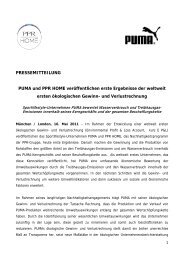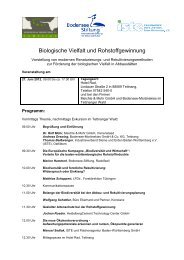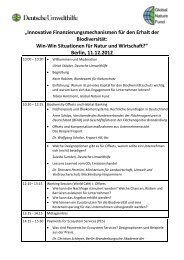here - the European Business and Biodiversity Campaign!
here - the European Business and Biodiversity Campaign!
here - the European Business and Biodiversity Campaign!
Create successful ePaper yourself
Turn your PDF publications into a flip-book with our unique Google optimized e-Paper software.
IV. World Café Results ________________________________________________________________________<br />
IV. World Café Results<br />
The World Café is a method to establish an open <strong>and</strong> creative conversation process on a certain topic<br />
in a business meeting or workshop. The method’s aim is to surface participant’s collective<br />
knowledge, share ideas <strong>and</strong> insights, <strong>and</strong> gain a deeper underst<strong>and</strong>ing of <strong>the</strong> subject <strong>and</strong> <strong>the</strong> issues<br />
involved. The results of <strong>the</strong> workshop’s World Café are presented in this chapter.<br />
1. What is our motivation to create successful partnerships?<br />
The motivation of NGOs to engage in partnerships with companies is manifold. It should be clear that<br />
<strong>the</strong> reasons are not always purely idealistic. Most often, NGOs seek to solve an environmental<br />
problem at a local, regional, national or international level that can not be solved by <strong>the</strong> NGO alone<br />
or that is caused by a company or industry sector. Companies on <strong>the</strong> o<strong>the</strong>r h<strong>and</strong> have access to<br />
different financial resources to fund partnerships for <strong>the</strong> protection <strong>and</strong> sustainable use of<br />
biodiversity. Fur<strong>the</strong>rmore, companies have expertise in addressing different audiences which NGOs<br />
are interested in approaching to improve awareness <strong>and</strong> facilitate action. In a time, when public<br />
authorities relinquish more <strong>and</strong> more duties <strong>and</strong> reduce public funding, NGOs are looking for<br />
different partners (i.e. companies) to achieve <strong>the</strong>ir objectives.<br />
2. Which elements are missing at <strong>the</strong> moment?<br />
� Practical <strong>and</strong> easy to use methodologies to<br />
assess <strong>the</strong> impact <strong>and</strong> dependence of<br />
companies on biodiversity<br />
� Performance indicators to monitor <strong>the</strong><br />
progress of implementing a company’s<br />
biodiversity strategy<br />
� Knowledge <strong>and</strong> experiences to underst<strong>and</strong><br />
<strong>the</strong> business case for biodiversity (e.g. drivers<br />
of change, legal framework, customer base,<br />
financial incentives) <strong>and</strong> convey <strong>the</strong> message<br />
to companies<br />
� Valuation of environmental services that do<br />
not provide a service in economic terms<br />
(intrinsic value of existence)<br />
� More open-mindedness <strong>and</strong> business thinking<br />
3. What advice can we give ourselves <strong>and</strong> o<strong>the</strong>rs?<br />
Traditional l<strong>and</strong> uses that have positive effects<br />
on <strong>the</strong> biodiversity can be supported by NGOcompany<br />
collaborations. (source:FGN)<br />
Much of <strong>the</strong> advice given focused on inter <strong>and</strong> inner-NGO aspects. NGOs should be aware of <strong>the</strong>ir<br />
strengths because cooperation between <strong>the</strong>m can be used to achieve more. The different roles that<br />
NGOs play should be exploited, for example <strong>the</strong> “good cop, bad cop” strategy with organizations like<br />
Greenpeace that are mainly for <strong>the</strong>ir public protest campaigns.<br />
NGOs should also improve <strong>the</strong>ir knowledge, especially related to economic issues, so that <strong>the</strong>y are<br />
able to underst<strong>and</strong> <strong>and</strong> communicate better with <strong>the</strong> business partners. This collaboration needs to<br />
be seen as a long-term approach. Enough time should be taken into account for finding shared values<br />
<strong>and</strong> risks. NGOs need to be realistic about what <strong>the</strong>y can deliver <strong>and</strong> communicate <strong>the</strong> collaboration<br />
as something positive, a joint effort of creating something toge<strong>the</strong>r.<br />
9








